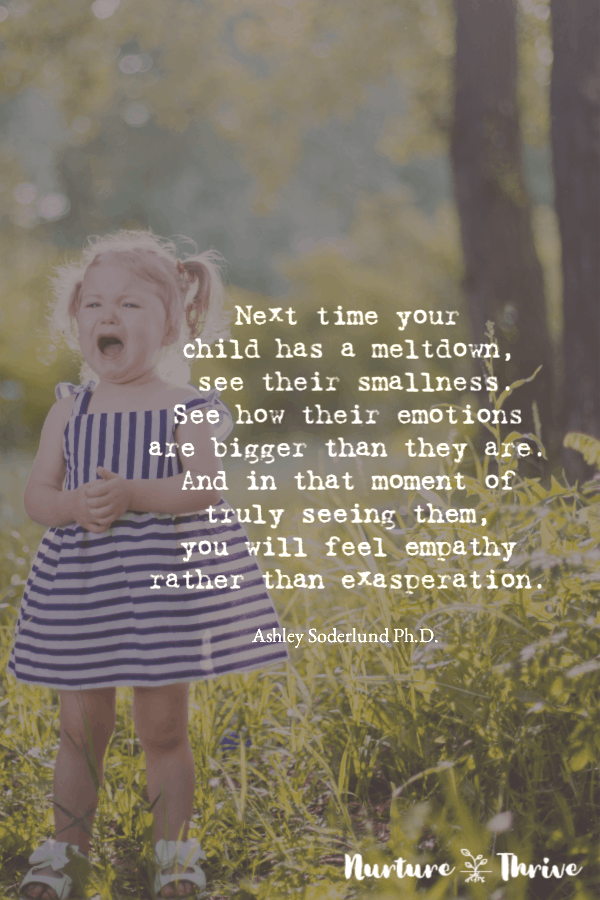Inside: 5 Steps to master your own emotions and know your triggers so you can be a calmer parent– even when your child is not calm!
Let’s face it — when it comes to the child-parent relationship, there is one person who has mature self-control and one smaller person with considerably less self-control.
The result is that as parents, we not only have to regulate ourselves but also have to help our kids regulate.
Kids are literally uncivilized. They don’t know or understand the social rules we have for when and how to express emotions.

It turns out, that is one of our main tasks as a parent — to teach our kids how to express themselves in a way that honors their emotions but is also prosocial.
Early childhood is a prime time for learning emotion and self-regulation — the brain is fully plastic and ready to learn. But that also means it is immature, not well-connected in those areas, and disorganized.
It will be quite a while before our efforts to teach them self-regulation pay off.
Depending on age, temperament, and what’s going on in their lives, our kids are not yet well-equipped to handle disappointment and frustration, calm down, focus on a goal, evaluate options, or make well-thought-out decisions.
Parents Are Developing Self-Regulation Skills As Well
But how well-equipped are we as parents? What have we done before that baby comes to prepare ourselves to handle a being who has little self-control?
Well, if you are anything like me — not very.
Maybe that is one reason people say you can never really prepare yourself for having a child—that before becoming a parent, you have no idea what it is like to be fully responsible for someone else, to always think of them, and to put their needs before your own.
On the other hand, we’ve been preparing our whole lives for this moment—our self-regulation system was highly influenced by our childhood and our experiences as adults.
Some of us are better regulated by nature, and some of us may be better regulated because of experience, but all of us will have to work on ourselves and adapt once that baby is born.
And then we will have to keep on adapting. As our children grow we will grow also, only our growth will be on the inside.
*Note: If you feel like self-regulation is a deeper issue for you, you aren’t alone. This is something that can be improved in therapy or with a parent coach. I am not a therapist and the information here is for educational purposes only. Use this tool to find a psychologist near you.
As parents, we often seem to have an instinct for knowing what our children need, and yet we also find ourselves befuddled, irritated, and sometimes in a battle of wills with these little creatures who have yet to learn the rules and ways of socialization.
Case and point — I dare you to cut a piece of toast or a sandwich into squares when triangles are expected!
We talk a lot about the importance of teaching kids self-regulation, but what about our own? How do we develop these skills? How can I teach my son to handle his frustration when sometimes I can’t handle my own?
Luckily, our kids have a way of hone in on just what we need to work on—they can push our buttons like no other! As if they are Jedi Masters, our kids will quickly expose our weak spots and challenge us daily. We simply have to take that challenge and be mindful of it.
How to Be a Calm Parent: Five Steps to Calm and Centered
1. Reframe Your Expectations: Pause and Observe
Like everything on this list, this isn’t something you do once and you are done. Partly because your child is always changing and growing and along with that growth, your expectations of them will change.
As parents, we help them develop, but we must accept where they are, too.
Children will be more emotional than we are. With limited regulation skills and constant cognitive leaps, they are bound to have bad days.
Remind yourself that self-control skills are not organized in the brain until the age of three and do not mature until the age of 5 or 6. There is continuous development throughout childhood and a second major growth spurt of self-control in the brain during adolescence. Some estimates place final maturation at the age of 30.
“So often, children are punished for being human. Children are not allowed to have grumpy moods, bad days, disrespectful tones, or bad attitudes, yet we adults have them all the time! We think if we don’t nip it in the bud, it will escalate and we will lose control. Let go of that unfounded fear and give your child permission to be human. We all have days like that. None of us are perfect, and we must stop holding our children to a higher standard of perfection than we can attain ourselves. All of the punishments you could throw at them will not stamp out their humanity, for to err is human, and we all do it sometimes.”
The Newbie’s Guide to Positive Parenting
― Rebecca Eanes
So, how do we reframe and observe?
The next time your child screams because you cut the toast wrong, yells because they can’t get the Lego structure right, has a breakdown after school, or starts whirling around in a ball of emotions for seemingly no reason — just look at them and observe.
Observe them as if they are from another planet because, in a way, they are. Remember that their brains aren’t like ours yet. See their smallness. Observe with open curiosity and really see them. Once you really look at them, you’ll begin to empathize with this little being who just can’t even right now.

Print out inspirational quotes to remind yourself to be open to their bad days, crankiness, and lack of regulation, and stick them around your house to help you remember to adjust your expectations and see your child for where they are in that moment.
Save this one for those hard moments! 10 Inspiring Quotes for Those Really Hard Parenting Moments
2. Separate Your Emotions from Theirs: Find Your Center
A friend of mine from graduate school once talked to me about her approach to her son’s meltdowns. Her wisdom has stuck with me over ten years later now (and her son is grown and in college!)
She said, “just because he’s having a meltdown, doesn’t mean I have to have one. His emotion regulation isn’t tied to mine. I stay calm because I’m not the one freaking out because playtime at the gym is over — he is.”
Jan Karass, Developmental Psychologist
There is power in staying calm. In my recent reader survey, I asked, “How did you feel the last time you stayed calm?” Here are some of your responses:
“For me, there’s a great deal of freedom in remaining calm when my daughter (or even the world around me) feels nothing but calm. I don’t have to react to every little thing. Instead, I can be present to the situation at hand and give it my best self.”
“I felt more in control of the situation and less anxious, more confident. I felt like he responded better because of my calmness.”
“I felt empowered. I was able to empathize and support fully without having to deal with my own emotions at the same time. It doesn’t always happen that way, but it’d be nice if it did.”
Start keeping a list of your triggers. What sets you off? For me, it’s noise. The louder it is, the harder it is for me to keep my calm. Also, when other people are affected, I tend to start stressing when we are in public. At these times, I need to brace myself for my son’s emotions—I have to get centered.
How to get centered
When you feel yourself start to react, have a mantra at the ready (which has been shown to calm the brain in imaging studies) — take a breath (a proven way to halt the stress response) and say a simple phrase to yourself. Something that steadies you or calms you.
I find that it is helpful to physically root yourself or center yourself as you do this. Engage your core (which also has a physiologically calming effect) and plant your feet firmly on the ground. Take a deep breath and say your mantra to yourself. Now you are in a place of strength to weather their storm.
Here are a few examples:
- “Respond with care”
- “Let Be”
- “I am their Mom”
- “I am here for you”
3. Build Your Parenting Toolbox: Learn Tools and Strategies
How you handle your little one’s regulation problems is intertwined with your own regulation. If you have a plan for handling these situations, you will feel better equipped. If you feel better equipped, you will be better regulated.
If you regulate and respond instead of reacting to your child, you will already be more effective in helping them. The next step is parental self-efficacy, or how confident you feel in your ability to positively impact your child’s behavior and development. I know I feel more confident when I have a plan and when I have intentions for how I am responding to my child.
Don’t know where to start? Here is my 3-step plan to respond instead of reacting to your child: Act: Acknowledge, Connect, Teach.
Here is another way to get started: Identify a trigger or stressful situation — lately morning routines have been stressful for us, and I find myself lacking patience. I started by trying to figure out why I was stressed. My son was waking later and later and we had less time. He was also less focused. So, I started waking my son up a little earlier, which also meant making sure he got to bed on time. I also created and printed out a morning routine chart to help keep him on task.
Having a plan made me more intentional, instead of just reacting to the situation and hence, better able to stay calm.
4. Take Care of You: Regulate Your Emotional Health
In my recent reader survey, many of you said that being well-rested is a big factor in staying calm. Being well-rested and ready to face challenges is probably our biggest challenge in modern parenting.
Maybe it is because we do too much, or because we have very little societal support, but the reality is that we are overtired, overspent, and just overdone. Here are some of the things you said when I asked how you felt after a time you were able to stay calm with your child:
“It felt good while my son was upset. Afterward, I still felt drained and a bit concerned with the thought that the parenting challenges are only going to get harder.”
“I felt like it was still emotionally stressful for me even if I was calm on the outside. Took me a few minutes to calm down even. Though I had “kept my cool” on the outside.”
“It was still stressful for me. It seemed to take a lot of effort to stay calm. It was easier after the meltdown to reconnect and help my child through the situation.”
These responses are so insightful. Yes, we may feel empowered, but staying calm takes a toll. It’s harder when we ourselves are tired or stressed. We only have so much in our emotional reserves. When we feel our reserves dwindling, we need to take the time to take care of ourselves.
Part of that is getting real and stopping trying to do it all. I love developmental psychologist Alison Gopnik’s idea that parents are a gardener, not a carpenter. She says:
“Love doesn’t have goals or benchmarks or blueprints, but it does have a purpose. The purpose is not to change the people we love, but to give them what they need to thrive.”- Alison Gopnik, The Gardener and the Carpenter
Part of it is truly taking a break when we need it. Amanda Rue from Dirt and Boogers has some great practical advice on how to take a break, even when you are home with the kids and even when they are crazy! No more excuses: Take a Mom Break, Without Your Kids Driving You Batty. And here are 100 Self-Care Ideas That Will Fit Easily into Your Busy Schedule from A Fine Parent.
And part of it is being able to live for the moment. Finding joy in the mundane and in your everyday routine will lift you. It’s both easy and hard to do with kids. For more on mindful parenting and your brain changes in adulthood, read this.
No more Bad Days, Only Bad Moments
I absolutely loved this article from Sunny Day Family on having no more bad days, only bad moments. It eye-opener opener for me. In it, she writes about her last conversation with her dad which happened on a day when her kids weren’t napping and driving her crazy (read it here). She quotes Amy Van Dyken-Rouen, an Olympic gold medalist who was paralyzed in an ATV accident:
I have no time or room for an entire day to be a “bad day.” I will have bad moments, but to waste an entire day on it isn’t worth it. How would I have felt if my day before my accident was a “bad day” and I didn’t pull through? How would that leave my friends and family? It’s not worth it. Have a bad moment, and move on. — Amy Van Dyken-Rouen, Today, December 2014.
So, let’s all be a little easier on ourselves. Perhaps, this cartoon from the Dutch artist and mother Betje, sums it up best…
5. Know What to Do When You Lose It: How to Repair
Because you will — I have and you have, we can all admit it now. We have lost it in the worst ways on the worst days. We have lost it when we feel like we have no reason to, and we have lost it when it was just the last straw.
Wouldn’t it be weird if you didn’t ever lose it? That would be something to live up to as a child — perfect regulation always. Losing it is part of it, part of life, part of relationships. Your kids should witness this and they will. So, give yourself some grace and use it as an opportunity to model self-regulation for your kids:
- Own it — Admit that you lost your temper or got frustrated.
- Apologize — Sometimes parents make mistakes too.
- Identify — Tell your child what it was you did to calm down.
I got really mad, didn’t I? Sometimes parents feel angry too. Everyone has feelings. I yelled at you and I shouldn’t have done that. I’m sorry I hurt your feelings. But then, I took some deep breaths and I calmed down didn’t I? I love you and I will work on not losing my temper.
This is great on so many levels — it shows that everyone makes mistakes, but that mistakes can be overcome. It allows your child to develop forgiveness and empathy. It allows you to model some self-regulation and makes you aware of your weak spots or trigger points. It also makes you conscious of your regulation tools or skills so that you can suggest them to your child when they are upset. And finally, it is helping your child practice healthy relationship skills.
For more on what to do after you lose it and seven things to say after you yell (another printable) read this: 4 Critical Things to Do After Yelling at Your Child: How to Repair
Just remember, this is a journey, not a destination– one we parents are all on together. So, if you see me in the preschool parking lot calmly handling my son’s breakdown, applaud me and if you see me flustered and frazzled, sympathize — I promise, I’ll do the same for you.

 Best Board Games For Kids: Games that are Fun and Boost Your Child’s Executive Functioning Skills
Best Board Games For Kids: Games that are Fun and Boost Your Child’s Executive Functioning Skills